Looking for the best campervan solar panels to power your van life? Here are our top 8 recommendations for the best camper van solar panels for your van.
When it comes to van life, you’re going to find yourself in some truly remarkable and Instagrammable places in your van. One of the biggest joys in living a nomadic lifestyle is the ability to get off-grid to explore and enjoy the great outdoors.
But how long you can stay there may end up depending on how big of a battery bank you have and whether you can conserve your power enough to not harm your batteries.
Your power system is by far the most important consideration of any camper van conversion. And while you may have invested in some great batteries – either AGM or lithium – to store quite a bit of energy, keeping those batteries topped off is important for their long-term health.
There are various options to charge the battery bank. You can charge it while driving, by shore power on camping sites, or at public places with a power outlet.
And you can even run a generator to add power back into your batteries. But the best method to charge camper van batteries is a solar power setup.
Solar power is an efficient and environment-friendly option for charging the battery banks when you are not close to the shore power.
The panels convert solar energy to electricity using photovoltaic cells. They are relatively inexpensive to purchase and install, need minimal maintenance and produce ample electricity at almost zero running cost.
Of course, even the best solar panels can be limited by the solar charge controller. So be sure to purchase the best charge controller to accompany whichever panels you decide.
Finding the best camper solar panels can be tricky. They are available in many styles, features, brands and prices. Considering the number of options, selecting RV solar panels is never easy.
So, we have narrowed down the options for you to the 8 best campervan solar panels.
We’ll help you understand why these are the best to choose from and will describe what to look for in a solar panel before buying.
On that note, let’s get into our top pick for the absolute best solar panel options for your camper van conversion.
Do note that with almost every one of our recommendations, there are larger and/or smaller versions of the panel available. For example, our Editor’s Choice is the 100W version of a panel that you may also find in 50W, 160W, 175W and even 200W versions. So once you decide on which panel is best for your campervan you may want to buy either the larger or smaller version based on the dimensions of your roof.
Our Pick – Renogy 100-watt Solar Panel
High-quality, durable panels
Small and sleek design
Industry-leading brand name
Best Product // Our Top Picks at a Glance
| Product | Wattage (Watts) | Rigid or Flexible | Fixed or Portable | Dimensions (inches) | Weight (lbs) | Price Range |
| Renogy 12V High-Efficiency Solar Panel | 100-watts | Rigid | Fixed | 42.4 x 20.0 x 1.4 | 14.3 | Around $100 |
| Newpowa Monocrystalline RV Solar Panel | 100-watts | Rigid | Fixed | 44.5 x 19.9 x 1.18 | 16.4 | Around $100 |
| Windy Nation 400W Solar System | 400-watts kit | Rigid | Fixed | 39.2 x 21.3 x 4 | 70.4 | Under $750 |
| Renogy Rover 400W Solar Kit | 400-watts kit | Rigid | Fixed | 42.2 x 19.6 x 1.4 | 72.8 | Under $750 |
| Renogy 100W Flexible Solar Panel | 100-watts | Flexible | Fixed | 48 x 21.6 x 0.08 | 4.2 | Around $200 |
| Sun Power 170W Flexible Solar Panel | 170-watts | Flexible | Fixed | 45.4 x 31.9 x 0.8 | 12.6 | Under $500 |
| Renogy Portable Foldable Panels | 100-watts | Rigid | Portable | 27.2 x 19.9 x 2.8 | 26.6 | Under $300 |
| AcoPower Portable Solar Kit | 100-watts | Rigid | Portable | 28.5 x 21.5 x 4.3 | 26.3 | Under $300 |
Table of Contents
- The 8 Best Campervan Solar Panels for Van Life in 2024
- Best Overall: Renogy 12V High-Efficiency Solar Panel
- Runner Up: Newpowa Monocrystalline RV Solar Panel
- Best Solar Panel Kit: Windy Nation 400W Solar System
- Runner Up: Renogy Rover 400W Solar Kit
- Best Flexible Solar Panels: Renogy 100W Flexible Solar Panel
- Runner Up: Sun Power 170W Flexible Solar Panel
- Best Portable Solar Panels: Renogy Portable Foldable Panels
- Runner Up: AcoPower Portable Solar Kit
- What to Look for When Choosing the Best RV Solar Panels
The 8 Best Campervan Solar Panels for Van Life in 2024
There is an ever-increasing number of solar panel options on the market, making choosing the best ones for your van challenging. We’ve sorted through them all and have narrowed down the list for you based on type, power output, cost, efficiency and ease of installation.
You’ll recognize a few brand names pop up several times because there are several products from each company that make our top 10 list.
So if you find yourself in doubt as to whether a specific solar panel we mention has the right size or wattage for your solar setup, you can’t go wrong with choosing any solar panel product from Renogy, Windy Nation or NewPowa.
NOTE: We do not recommend polycrystalline solar panels for any campervan or RV installation. These panels are less efficient and include outdated technology inferior to their monocrystalline counterparts. You will only find monocrystalline solar panels on our list.
Best Overall: Renogy 12V High-Efficiency Solar Panel
- Price Range: Around $100
- Wattage: 100 Watts
- Rigid / Flexible: Rigid
- Fixed / Portable: Fixed
- Dimensions: 42.4 x 20.0 x 1.4 in
- Weight: 14.3 lbs
We consider the Renogy 12-volt 100-watt panel as the best campervan solar panel due to its efficient energy production, superior build quality and easy installation.
The monocrystalline solar panel provides excellent value for money by delivering between 400-500 watt-hours (33-41 amp hours) on a sunny day. It has efficient bypass diodes that minimize the power drop on cloudy days and keep the solar cells from overheating.
We also feel that the build quality of Renogy 100-watt is exceptional. The cells are made from pure silicon and multi-layer laminations protect silicon for long and reliable life. Top tempered glass is anti-reflective with low iron content enhancing stiffness and impact resistance.
We’ve put our panels to the test in high winds, extreme heat and cold and even an incredible hail storm and they came out working as well at the end of each event as they did on the first day we installed them!
The aluminum frame is corrosion-resistant making it ideal for outdoor usage. The solar panel is IP65 water-resistant. It can withstand a high wind pressure of 2,400 Pa and a snow load of 5,400 Pa. In other words, it can take a beating!
The Renogy 100-watt solar panel is a versatile device. It comes with pre-drilled holes to mount on the van’s roof. Moreover, the panel is compatible with different charge controllers and mounting arrangements.
On the downside, should you have any technical issues or need help with a DIY install, Renogy’s customer service is not always responsive.
We have ALWAYS connected with their technical team when we needed to. However, we have often waited hours on hold or days between email correspondence.
And you’re also buying the Renogy name when you invest in this panel. You can usually snag a deal either directly through Renogy or on Amazon which makes the price more competitive. Otherwise, this panel is the best you’ll find.
PROS
- Effective energy production
- Handy bypass diodes to minimize power drop.
- Water and corrosion-resistant body.
- Easy to install
- Robust build quality.
CONS
- Renogy customer service is not always great
- A little pricey compared to other 100W panels
Runner Up: Newpowa Monocrystalline RV Solar Panel
- Price Range: Around $100
- Wattage: 100 Watts
- Rigid / Flexible: Rigid
- Fixed / Portable: Fixed
- Dimensions: 44.5 x 19.9 x 1.18 in
- Weight: 16.4 lbs
We believe that Newpowa produces some of the best and most affordable rigid solar panels. This monocrystalline panel is rated at 100W and delivers similar performance as our top-rated Renogy product.
Newpowa includes robust corrosion-resistant aluminum construction to withstand rain and harsh weather. The solar cells have ethylene-vinyl acetate layers for efficiency. Moreover, the male and female connectors are water-resistant, while the junction box is also weatherproof and durable.
The junction box also has bypass diodes to minimize the power drop in shady areas, which is great because the best camping spots are not always in full sunlight.
We like that the Newpowa solar panel installation is pretty straightforward. Each panel has holes to easily mount it to the van roof and comes with a 3ft MC4 cable to simply connect and go.
It is compatible with most mounting brackets like the adjustable, pole mount, Z bracket and tilt mount options.
On the downside, the panel does not come with mounting hardware. And there is very little brand recognition right now for Newpowa, so you may feel like you are taking a chance with this product.
But it does have a significant 25-year warranty, which you are highly unlikely to need.
PROS
- Pre-drilled holes, MC4 cable, and connectors for easy installation.
- Long 25-year warranty.
- Exceptional build quality.
CONS
- Brackets are sold separately.
- Little brand recognition
Best Solar Panel Kit: Windy Nation 400W Solar System
- Price Range: Under $750
- Wattage: 400 Watts
- Rigid / Flexible: Rigid
- Fixed / Portable: Fixed
- Dimensions: 39.2 x 21.3 x 4 inches
- Weight: 70.4 lbs
Solar panel kits are great for van life. The kits allow for a complete campervan solar system and save a lot of time and money in shopping around.
This Windy Nation kit is one of our favorites because it comes with literally everything you need for your entire solar system, including solar panels, brackets, wirings, and an LCD MPPT charge controller.
You can even upgrade it to include a remote meter, wireless communication and 3x 100Ah AGM batteries.
The panels are also quite efficient on cloudy days, so you don’t have to worry about shady areas. You can wire them in either series, parallel or series-parallel to maximize the energy input.
The MPPT charge controller is expandable and handy. It can connect up to four solar panels, making it perfect for an extensive solar system. The MPPT technology is also state of the art.
On the downside, although it’s a complete kit it does not include a fuse. The fuse is not expensive and is easy to find. So we’re not sure why they didn’t include it as you will definitely want to fuse your panels.
And while Windy Nation has been a brand name in wiring and battery technology for many years, it is just breaking into the solar panel market.
PROS
- The complete kit comes with all the accessories.
- Expandable and useful LCD screen.
- Efficient power production on both sunny and cloudy days.
CONS
- Does not include a fuse.
- Little brand recognition
Runner Up: Renogy Rover 400W Solar Kit
- Price Range: Under $750
- Wattage: 400 Watts
- Rigid / Flexible: Rigid
- Fixed / Portable: Fixed
- Dimensions: 42.2 x 19.6 x 1.4 in
- Weight: 72.8 lbs
The 400W Rover kit is the premium solar panel kit from Renogy. It is a full-fledged solar kit with all the brackets, wires, 40A MPPT solar charge controller, fuse, 20ft adapter kit, 8ft tray cable, 2ft fuse cable and 4x 100-watt solar panels.
Moreover, it also has a Bluetooth module to conveniently monitor power input through mobile phones.
We love pretty much every Renogy product. And while we purchased each of these components separately, we’re big fans of the 40 Amp charge controller with over 98% conversion efficiency.
The rigid solar panels kit is excellent for campervans. It is easy to mount thanks to the included accessories and does not take up a lot of roof space comparatively while producing a good amount of electricity.
Each panel has a waterproof aluminum frame designed to work for decades. Included male and female connectors and junction box are waterproof. Furthermore, the cells have protective tempered glass to withstand heavy snow loads, wind and hail.
On the downside, Renogy has moved to include the option to purchase additional insurance beyond the standard warranty. Despite its robust body, it still comes with a 5-year material damage warranty.
We’re not entirely pleased with this because it implies that some components of this kit may not live up to the quality we’ve come to expect with Renogy.
PROS
- Plug-and-play solar starter kit
- 40 amp MPPT charge controller is excellent
- Includes all mounting brackets, hardware and wiring needed
- Handy Bluetooth to monitor remotely.
CONS
- Comparatively expensive
- Includes option for additional warranty
Best Flexible Solar Panels: Renogy 100W Flexible Solar Panel
- Price Range: Around $200
- Wattage: 100 Watts
- Rigid / Flexible: Flexible
- Fixed / Portable: Fixed
- Dimensions: 48 x 21.6 x 0.08 in
- Weight: 4.2 lbs
Flexible panels are pretty versatile with a huge number of applications. These flexible solar panels by Renogy are designed to sit perfectly on curved surfaces, which may be helpful depending on the structure of your van and any roof modifications you may have done.
The ultrathin, lightweight and portable solar panel can bend up to 248° and overall is an excellent product with a functional design.
The flexible panel is only 0.8 inches thick and weighs just over 4 pounds, which is less than a quarter of a traditional 100-watt solar panel.
All the connectors and junction boxes are waterproof. The flexible panel has six mounting holes with metal enforcement so you can screw it to the roof or glue it using a silicone structural adhesive to attach it to the roof.
On the downside, despite having a great design, it is not as efficient as normal solar panels. And the panel can get scratched because there is no protective glass layer.
PROS
- Practical design and application.
- Very thin and lightweight.
- Metal reinforced mounting holes.
CONS
- Not super efficient.
- Easily scratched
Runner Up: Sun Power 170W Flexible Solar Panel
- Price Range: Under $500
- Wattage: 170 Watts
- Rigid / Flexible: Flexible
- Fixed / Portable: Fixed
- Dimensions: 45.4 x 31.9 x 0.8 in
- Weight: 12.6 lbs
Sun Power is another foldable solar panel on our list. It is not as versatile as its Renogy counterpart, but it’s definitely more efficient.
We like this panel because it is great for an extensive off-grid electrical system. Sun Power uses 30V DC to ensure sufficient power output and charging ability. It is an ideal camper van solar panel as it can flex up to 30°, and has rigid lamination with a copper foundation for extra protection.
On the downside, there are plenty of complaints about the laminate side panel cover that is prone to delamination.
Although minimal damage on panel surfaces is normal and does not affect solar panels’ overall performance you pay a pretty penny for this panel and looks can leave you concerned. Sun Power has also been dinged by customers for not being entirely responsive in handling customer service.
Otherwise, this is a great option if you are looking for flexible solar panels for your campervan or RV.
PROS
- Big 170-watt power rating.
- Solid copper foundation with ETFE lamination on top.
- Crease and scratches do not influence the output.
CONS
- Expensive
- Questionable customer service quality
Best Portable Solar Panels: Renogy Portable Foldable Panels
- Price Range: Under $300
- Wattage: 100 Watts
- Rigid / Flexible: Rigid
- Fixed / Portable: Portable
- Dimensions: 27.2 x 19.9 x 2.8 in
- Weight: 26.6 lbs
We love this Renogy portable panel kit because it adds an entirely new dimension to charging your batteries. It has a two 50W panel combo capable of producing up to 500Wh per day, with a 20 amp charge controller included in the kit.
The dark color of the panels enables the solar cells to absorb more light for better energy yield.
The foldable, portable solar panel has heavy-duty handles, and latches and comes with a rugged carrying case.
Additionally, it has a premium black ionized frame and corner protectors to keep it safe if it falls – which is likely when traveling to off-grid camping destinations. The panels have adjustable and functional aluminum corrosion-resistant stands. So, they can keep facing the sun throughout the day.
For maximum solar output, its portability allows it to sit by the campervan side instead of mounted on the roof. You can add an additional radius to chase the sun even further away from the van by purchasing longer cables, though Renogy does not recommend anything longer than 20 feet.
Moreover, you can add multiple panels to this expandable system to increase power production. The solar panel has a temperature and battery voltage sensor, and you can monitor all that on the LCD charge controller.
On the downside, these panels are quite bulky for the power output they provide. But if you want the convenience and flexibility of portable solar panels then they are as good as you will find on the market.
Also, as with most Renogy products, you’re also paying for the brand name when you commit to investing in these relatively expensive panels.
PROS
- Smart, portable and expandable.
- Durable ionized black frame with corner protection.
- Adjustable aluminium kickstands.
- Waterproof charge controller
CONS
- Fairly expensive than other 100W solar panels.
- Relatively large array
Runner Up: AcoPower Portable Solar Kit
- Price Range: Under $300
- Wattage: 100 Watts
- Rigid / Flexible: Rigid
- Fixed / Portable: Portable
- Dimensions: 28.5 x 21.5 x 4.3 lbs
- Weight: 26.3 lbs
If you’re not interested in mounting solar panels on your roof, then this AcoPower kit is a perfect runner-up to its Renogy counterpart. Apples to apples, it is a two 50W solar panels combo with a combined rated power of 100W with the highest efficiency of up to 15.4%.
It is comparatively heavy and has adjustable kickstands to keep it anywhere on the campsite, under direct sunlight. This feature and grade A panels ensure maximum solar output.
Moreover, the included 10-amp solar charge controller prevents overcharging, discharging, overload and reverse connection.
The weatherproof connection box has bypass diodes to minimize the power drop. And a pre-installed controller makes it a generator or battery-ready kit.
We like that this kit includes alligator cables and proper fusing that allow you to connect the kit directly to your battery rather than having to wire it into your existing electrical system. The panel has multiple latches and handles around the body. And comes with a carrying case for portability and a sturdy frame with corner protection to keep the panel safe.
Solar setup is pretty simple. Open the adjustable stand and place it in front of sunlight and connect the wires. Moreover, it has all the connectors to easily connect it to the standard battery types.
On the downside, the Anderson plug has been known to be faulty and/or to not make solid contact, thus reducing the transfer of energy into the battery. Compared to its well-known Renogy counterpart, apples to apples, this model’s lack of brand recognition makes it a little pricey.
PROS
- Comes with many useful accessories.
- Rugged and waterproof construction.
- Efficient power production with excellent low-light performance
- Expandable up to 200W
CONS
- The Anderson plug does not always make solid contact
- Comparatively expensive
What to Look for When Choosing the Best RV Solar Panels
A campervan solar system is an essential investment. So, it is vital to make the best decisions possible for a better experience and a trouble-free life on the road.
You’re going to want to think through several key decisions about how many watts of solar power you need, whether you want to mount them on your roof or keep them portable and other important factors we’ll get into below.
Here are the things that every van lifer should consider before buying solar panels.
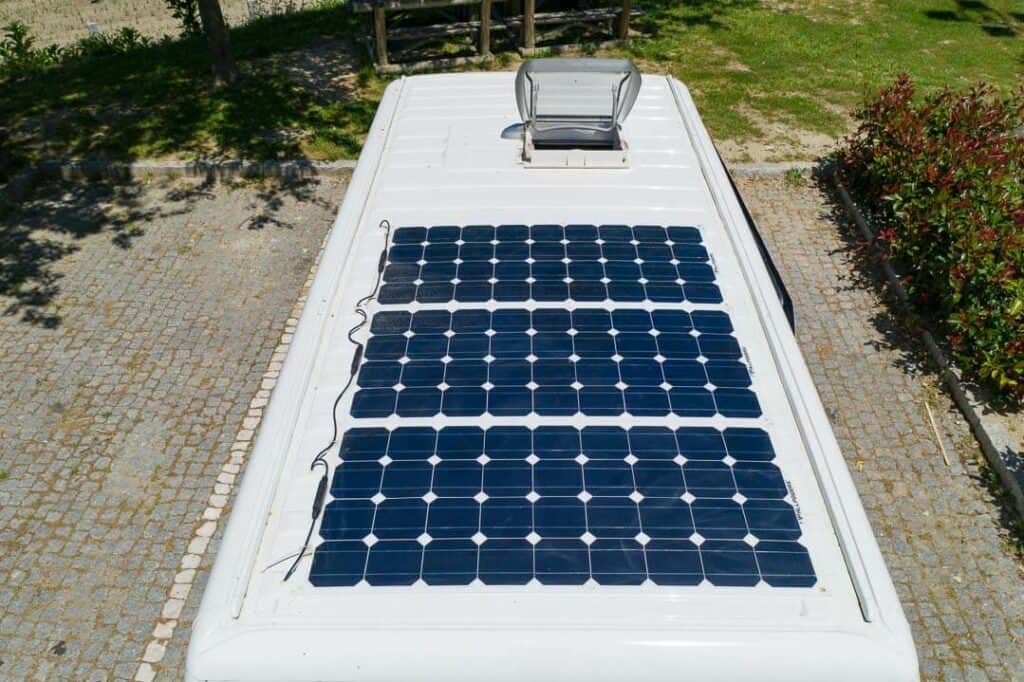
Types of Solar Panels
There are two major types of solar panels – monocrystalline panels and polycrystalline panels.
Monocrystalline Solar Panels
Monocrystalline panels are premium and slightly expensive solar products with a sleek appearance and superior performance.
They are called monocrystalline because single-crystal silicon cells are used to make these panels. Due to their single-crystal construction, monocrystalline panels have more room for electrons to generate a flow of electricity. That’s why they are more efficient than polycrystalline.
We only recommend monocrystalline solar panels due to this efficiency.
Polycrystalline Solar Panels
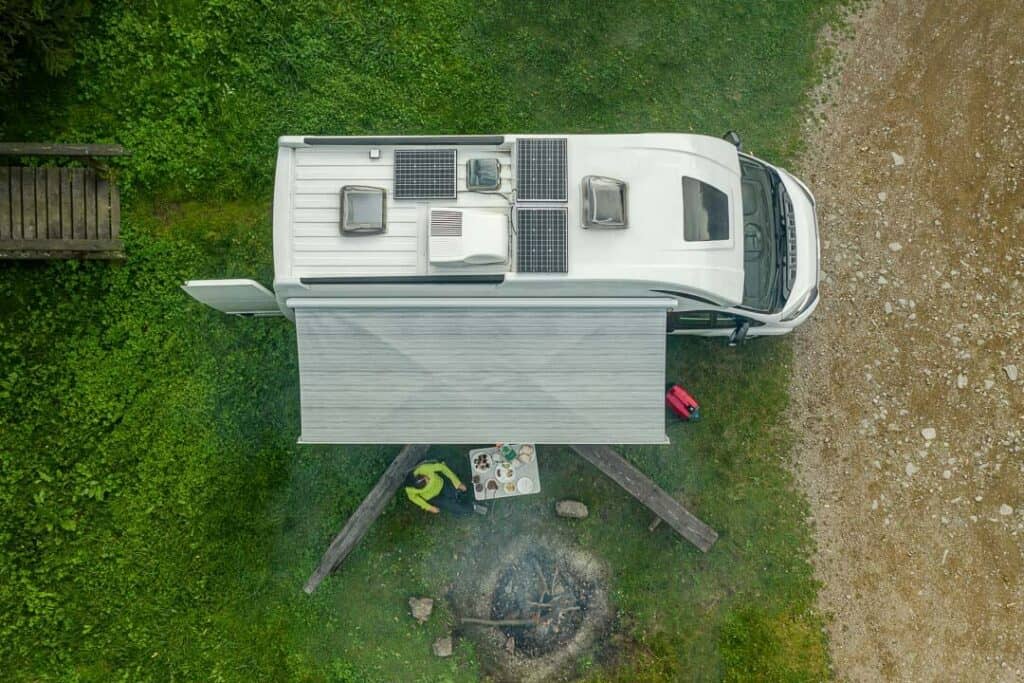
Polycrystalline panels are less efficient than monocrystalline. These panels tend to be cheaper and produce a blue hue in the panels, unlike the black of monocrystalline panels.
In polycrystalline solar cells, multiple silicon fragments are melted in a single wafer. This process leaves less room for the electrons to move and thus reduces their efficiency.
Long story short, we’d recommend that you only invest in monocrystalline solar panels. Investing in polycrystalline at this point in time is a waste of your money.
Wattage Output
Wattage amount is an essential consideration because you have limited space on the camper van roof and inside the van. So, you have to critically think about your power consumption and power needs.
Typical solar panels are rated at between 50W – 200W. For reference, 100W solar panels can produce 400 watt-hours of electricity per day in ideal circumstances. And you can increase the power generation by increasing the number of panels.
So before you start adding panels to your roof, you should first think through the size of your battery bank and evaluate how many watts of power you use on any given day.
If anything, it is better to invest in a larger and better house battery bank before adding more solar panels. But the perfect combination of battery capacity and solar panel size will keep your batteries topped off regardless of how much power you use throughout the day.
We’d recommend that the average van lifer not leave home with less than 200W of solar panels. But it’s more likely, and cost-effective, to consider a 400W system tied into 200-300Ah of AGM or lithium battery bank.
Flexible vs. Rigid Solar Panels
Rigid panels are the standard solar panels of which we are likely most familiar. These panels are slightly challenging to mount because you have to drill holes and attach brackets.
But they are solid and sturdy and less prone to scratching and breaking. Rigid panels have tempered glass on top and aluminum on the bottom to withstand the harshest environments. Moreover, they are more affordable than flexible panels.
Flexible panels, on the other hand, have a sleek and low profile. They are usually not thicker than an inch and weigh under 5 to 6 pounds. The thin and lightweight characteristics of flexible panels allow them to bend on curved roofs of the campervan.
Flexible solar setups are pretty straightforward. You can glue or bolt them to the van’s top.
Fixed vs. Portable Panels
Fixed panels are permanently placed on the roof or side of the van. They are constantly absorbing and converting solar energy. Which means they will charge batteries even when you are on the move. It is an excellent investment if you have plenty of space on the roof and sides.
Portable panels are typically sold as single units or two small ones. They can be placed on the roof but the proper way is to stop and point them towards the sun for power generation.
They have adjustable stands so that you can always keep the panels pointing to the sun. You can usually purchase cable extensions that allow you to park your van in the shade and still capture solar energy 15-20 feet away.
Critical factors to consider before selecting between these types are budget, space and power requirements.
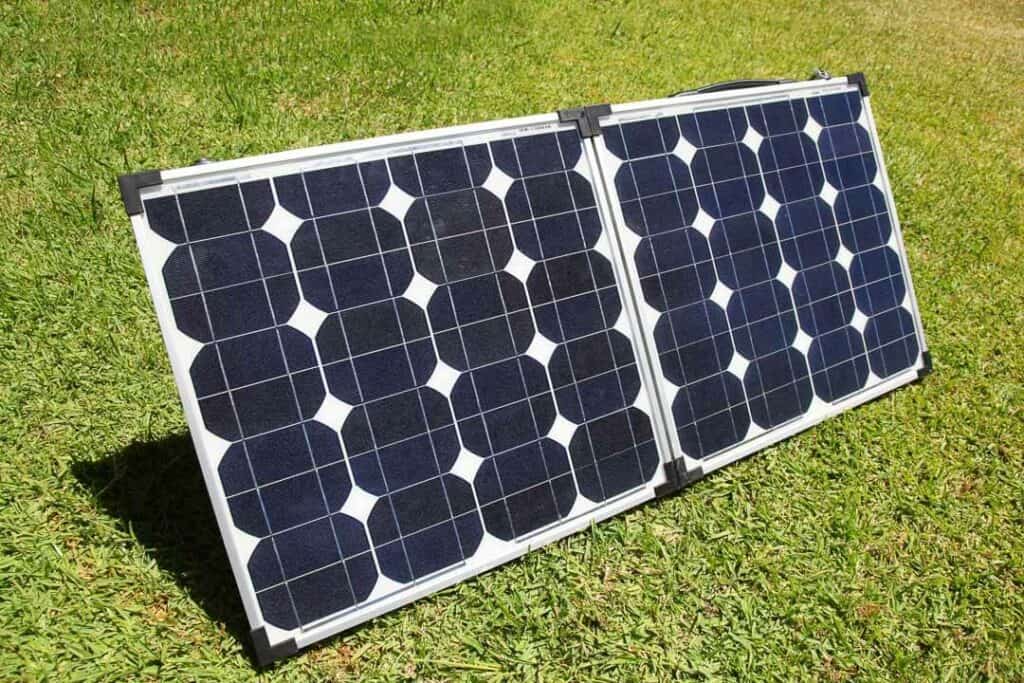
Other Features
Many additional features can add to the efficiency and convenience of solar panels. Some panels are sold individually, but there are solar kits as well. Solar panel kits have all the necessary accessories like controllers, mounting kits, wire clips and in short, everything you need to operate and mount solar panels.
There are several types of brackets and mounts. Tilt mounts are great for a campervan as they can increase solar generation by 25% when you are able to tilt the panels to capture sunlight when the sun is low in the sky in the morning and evening.
And then you may also find kits that include other power components such as inverters and batteries. Most manufacturers don’t include them in the package, but a few of them have.
Cost
The cost of solar panels is a crucial factor. You can literally spend as much or as little as you want on solar panels because there are so many on the market.
Cost is not a great factor in determining the quality of a panel. And expect decent quality panels to cost around $1-$1.50 per watt.
However, regardless of your budget consider solar panels a crucial investment in your campervan electrical system. It is better to purchase fewer higher-quality panels that you can later add to than to invest in inferior and outdated technology, as found in polycrystalline panels.
Wrapping Up
That is it with our guide and favorite solar panel recommendations. Now you have the knowledge to make an educated purchase decision. But you also have an idea of how diverse the market is.
In 2024, there are now dozens of brands and products that we didn’t begin to mention simply because they have not been tested with time. Solar panels are available in a number of different configurations, types, styles and much more.
So, if you don’t want to spend a couple of days in search of the best solar panel, then stick with our top recommended panels.
Our Pick – Renogy 100-watt Solar Panel
High-quality, durable panels
Small and sleek design
Industry-leading brand name
The Renogy 100W panels can generate 400Wh to 500Wh of electricity per day and have bypass diodes to enhance the low light performance.
Renogy has added every protective layer to keep it safe in the harshest environments. Moreover, it is quite versatile and compatible with almost all the available mounts and brackets.
DISCLAIMER: Some of the links in this article are affiliate links, which means if you book accommodation, tours or buy a product, we will receive a small commission at no extra cost to you. These commissions help us keep creating more free travel content to help people plan their holidays and adventures. We only recommend the best accommodations, tours and products that ourselves or our fantastic editorial team have personally experienced, and regularly review these. Thanks for your support, kind friend!

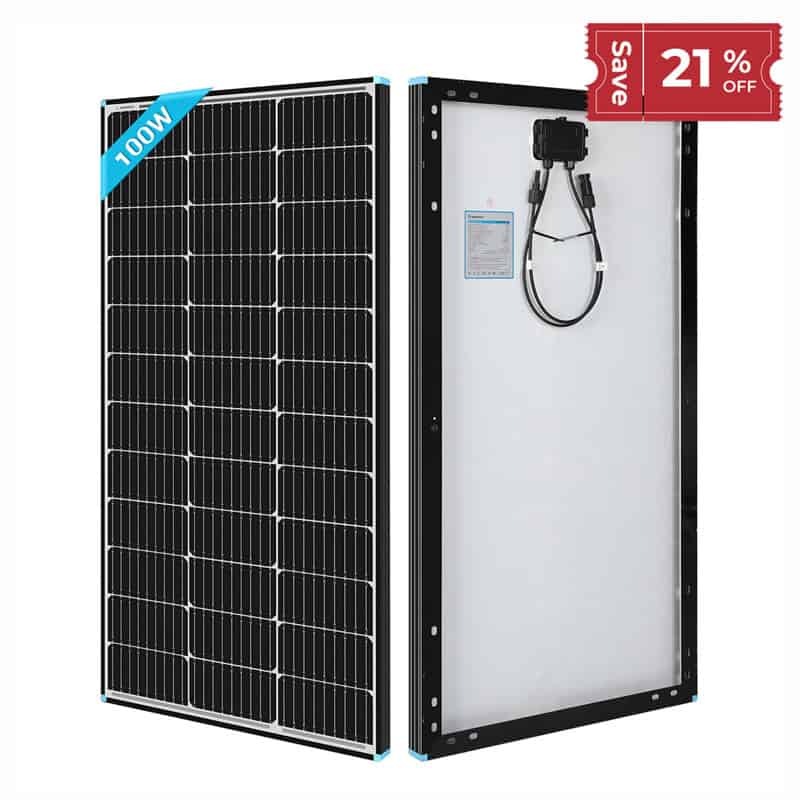
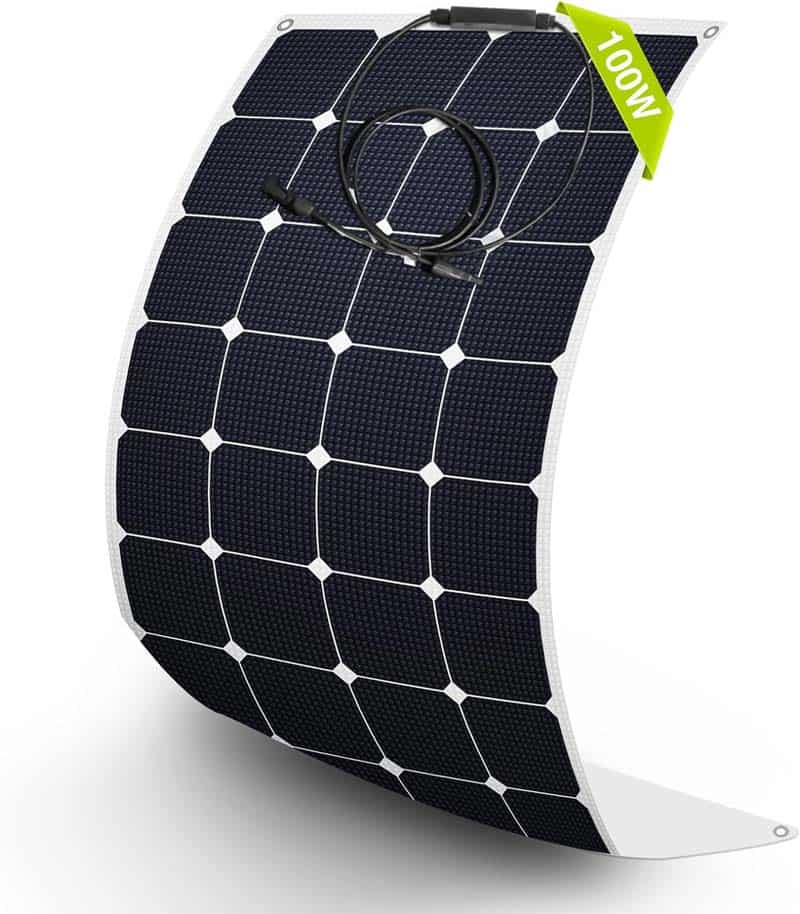
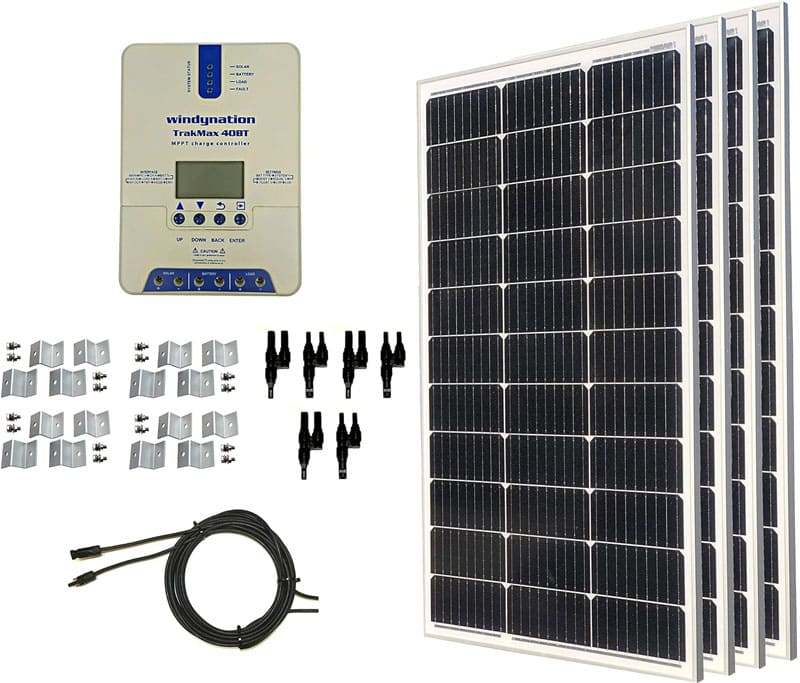
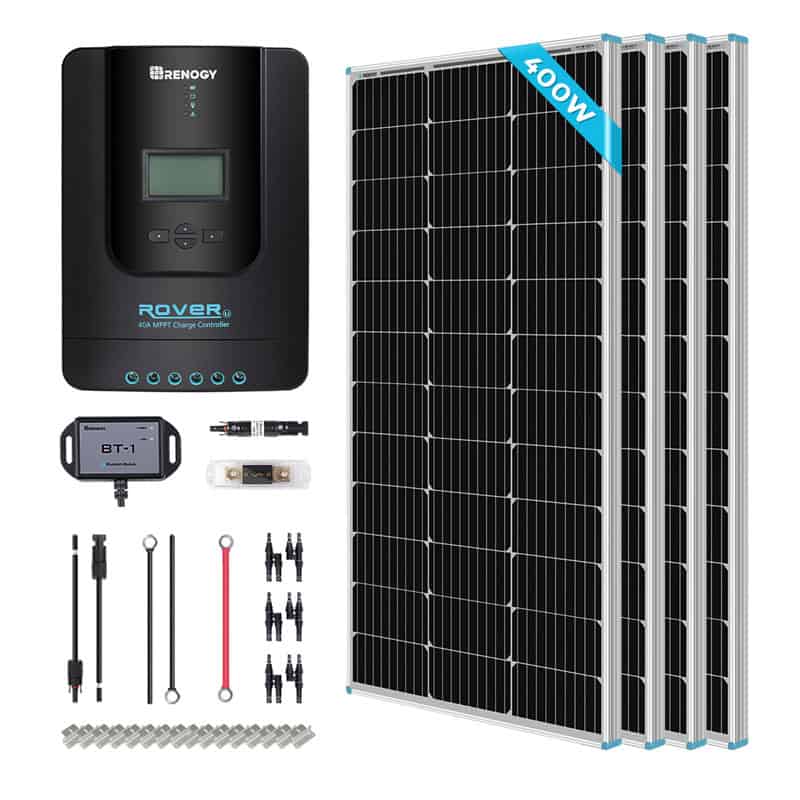
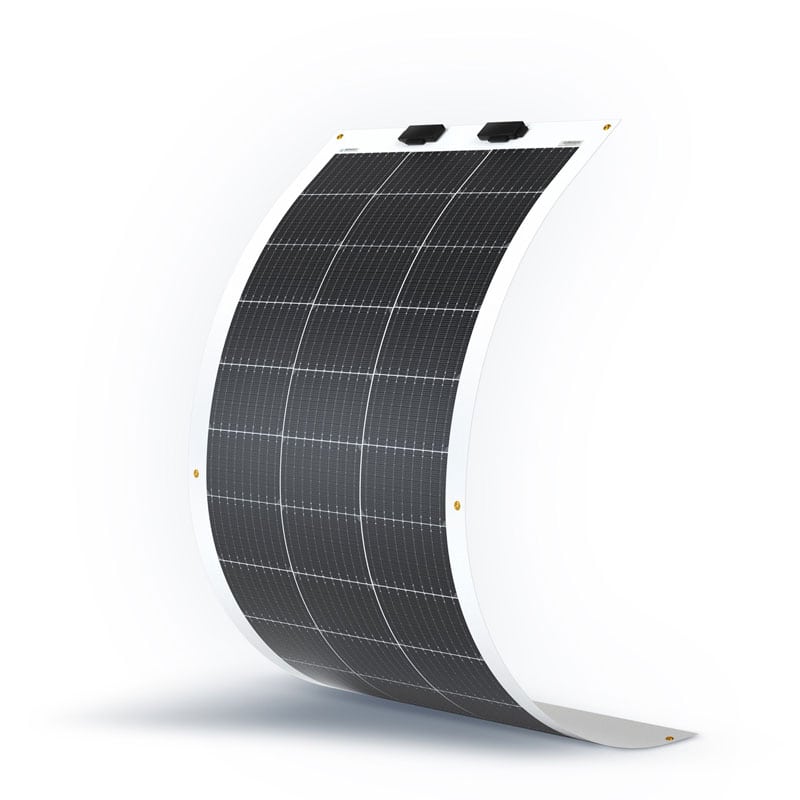
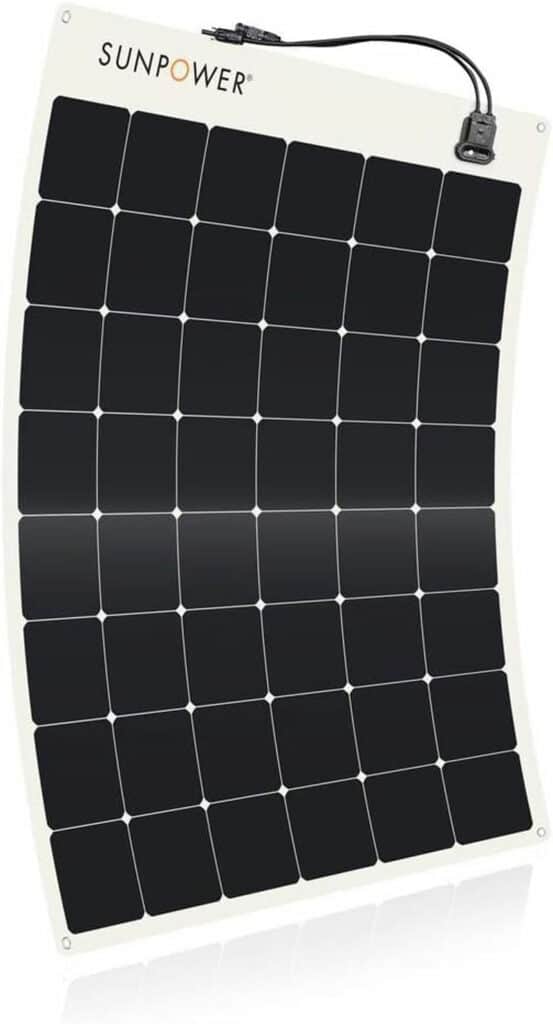
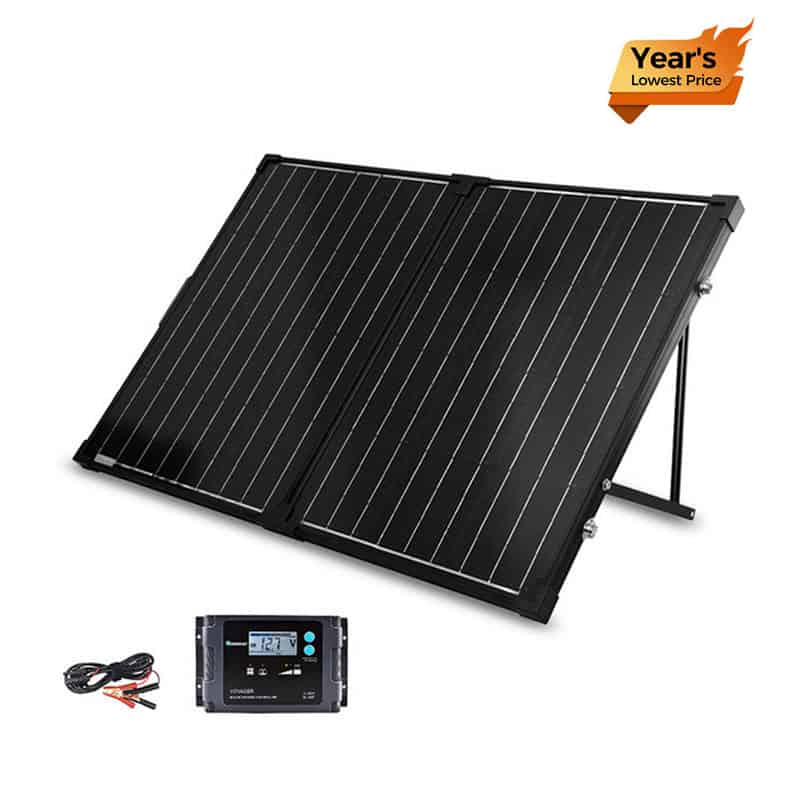
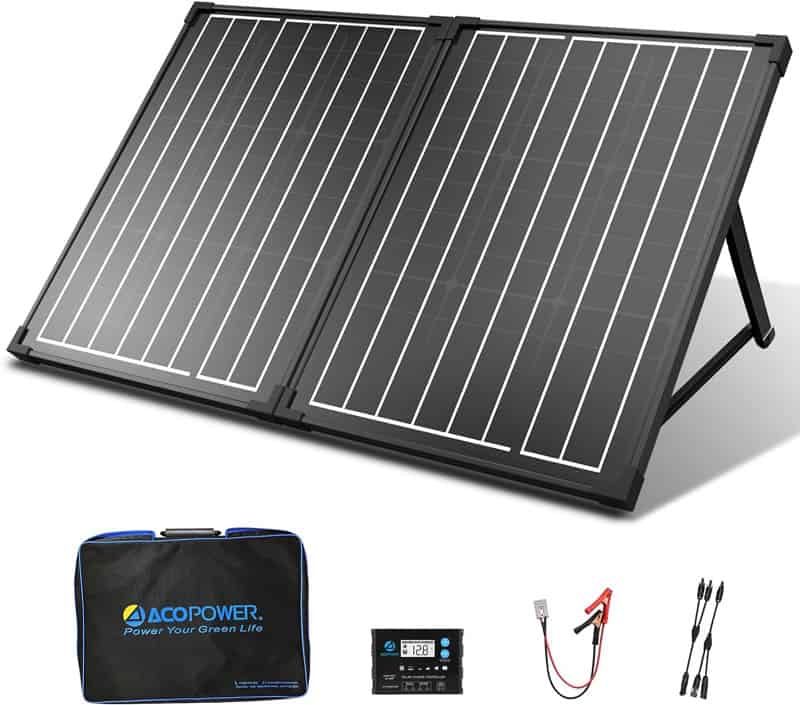
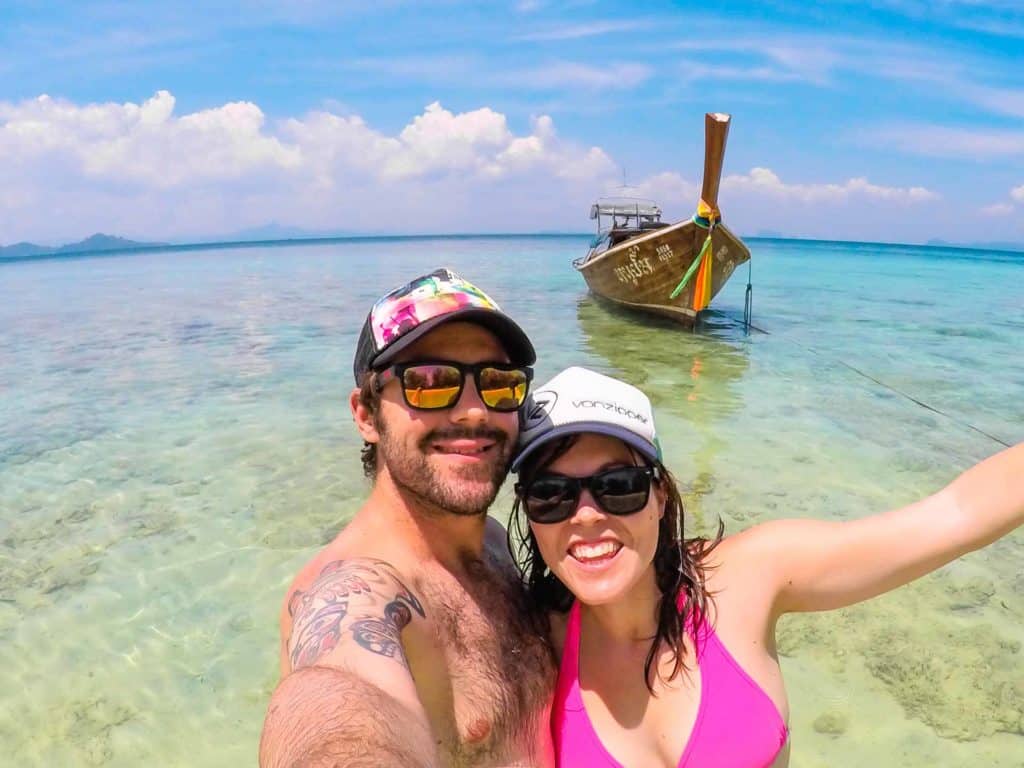
1 thought on “The Best Campervan Solar Panels for RV and Van Life [2025]”
My old Coleman solar panels (purchased from Costco and installed on my roof van in 2018) finally died in August 2024. I already have a Renogy MPPT charger and 1000W inverter. So logically, I ordered my new solar panels also from Renogy.
The first set of two 100W panels Renogy sent didn’t work. After six weeks of going back and forth with photos, Renogy told me to throw them away. They sent two more solar panels which also did not work. I then asked for my money back. All total, I spent four months dealing with Renogy to get my money back since they can’t seem to make a functioning solar panel.
My questions are:
1) Have you had a problem with faulty solar panels when they’re shipped to you?
2) Have you actually tried products from the companies you mention in this article? Or have you only used Renogy?
Thank you.